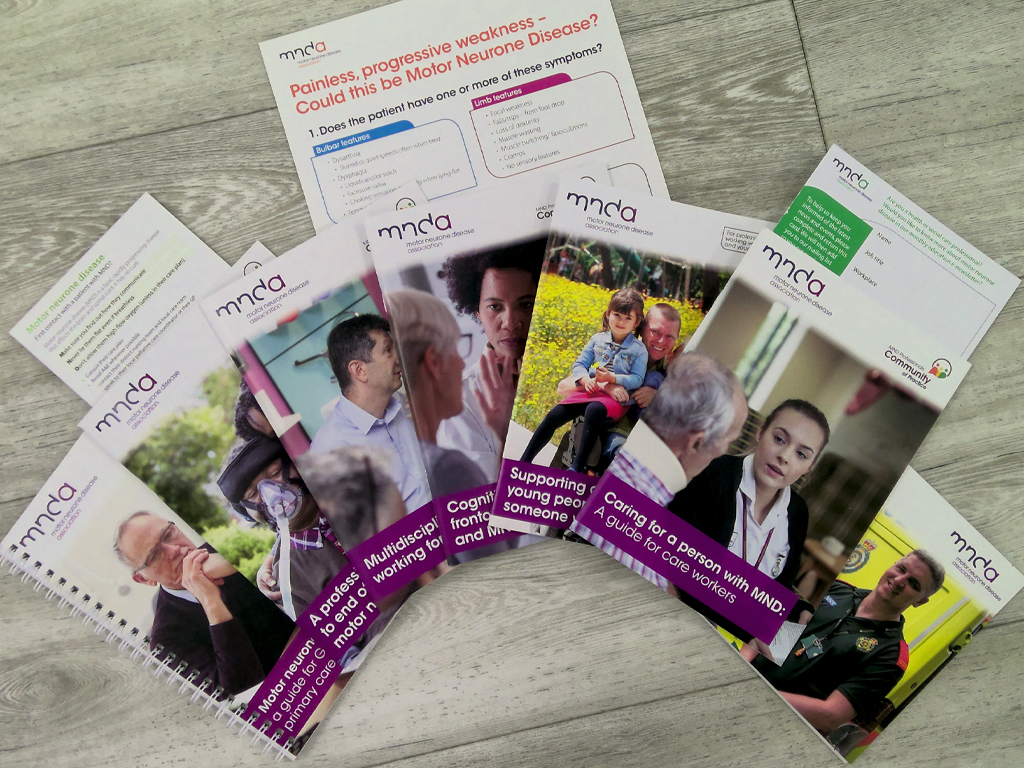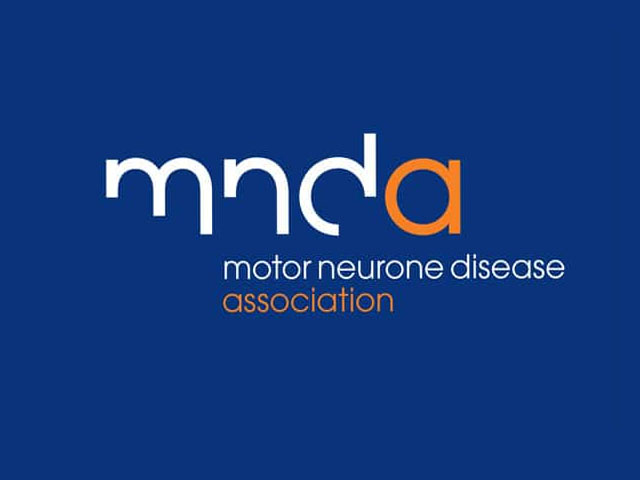
This information is for health and social care professionals.
Muscle wasting in MND causes weakness and can affect balance and posture, with the risk of falls.
General muscle tightness or spasticity (stiffness, rigidity and spasms) can affect mobility, coordination of movement and may cause pain or increase the risk of falls.
Download our head supports information sheet
Download our wheelchairs information sheet
Download our pain information sheet
Watch our training video on physical effects of MND
View our information on mobility and movement for people with or affected by MND
Muscle weakness and pain
Management
Consider:
- physiotherapy (including walking aids, orthotics, splints, active and passive exercise, posture management)
- occupational therapy for posture management and equipment for managing activities of daily living
- medication for spasticity
- an exercise programme to maintain joint range of movement, prevent contractures, reduce stiffness and discomfort, and optimise function and quality of life. It may be a resistance, active-assisted or passive programme and should be appropriate to the person's needs, function, abilities and preferences.
Fasciculations
- Fasciculations are often among the first symptoms of MND.
- Some people feel the rippling effect in individual muscles, but this can be more widespread.
- Fasciculations may be so obvious they can be seen by other people.
- They can seem worse when a person is stressed.
- The problem usually eases over time.
Ability to drive
All people with MND are required to inform the DVLA or DVA immediately after diagnosis, although they will usually be permitted to continue driving until weakness and/or cognitive change compromise safety. Judgement of continued driving capacity should be regularly discussed.
Wheelchairs for MND
Types of wheelchair
Each person will be individually assessed for the type of wheelchair they need. A wheelchair for someone with MND should be able to meet their current and future needs as the condition progresses. This will usually mean selecting a high specification wheelchair with a range of functions and postural supports.
It may be that these functions and supports aren’t fully used when the wheelchair is provided, but over the course of disease progression they become essential for the continued use of the wheelchair. Ordering a chair in this way prevents the need to keep changing the wheelchair and ordering parts, which can result in being a step behind someone’s needs.
Someone with MND may be assessed as needing more than one type of wheelchair.
Watch this video to find out more about selecting the right wheelchair for someone with MND
Powered Neuro Wheelchairs
The specifications of Powered Neuro Wheelchairs are well-suited to meet the needs of many people with MND.
The provision of the most appropriate wheelchair for people with MND has, in the past, been complicated. Most often, costly adaptations had to be made to existing wheelchair stock, leading to delays in people getting their wheelchair. The wheelchairs have been specified to avoid these problems, in an affordable way for wheelchair services.
Powered Neuro Wheelchairs are suitable for indoor and outdoor use and all have features that are designed to be adapted as the condition progresses, so that further costs can be minimised.
Features include:
- powered tilt-in-space, to overcome the effects of gravity and help prevent someone slumping, sliding down or falling to one side, while keeping their head supported in a forward-facing position. This feature can also prevent fatigue from attempts to maintain an upright posture
- a cushioned, tension-adjustable backrest, to accommodate an upper kyphosis (rounded upper back)
- a seatboard that can be supplied with the most appropriate cushion
- different headrest options that can be adjusted to suit as the condition progresses
- padded arm rests
- options for adding different controls and switches
- independent angle-adjustable foot rests.
Each wheelchair has been designed to offer a high specification at an optimum cost, and to be affordable within the remit of local wheelchair services.
Access to wheelchairs
Referral to the local wheelchair service, which will be provided by the NHS or Health and Social Care in Northern Ireland (HSCNI), should be made by an appropriate health or social care professional, in line with local policy. An assessment will then determine whether or not the person with MND needs a wheelchair and, if they do, the most appropriate wheelchair for their needs.
Timing your referral
Because MND is a rapidly progressive condition and the lead times for the statutory provision of wheelchair services can be lengthy, a timely referral to wheelchair services is critical. Someone with MND should be referred to wheelchair services when they are starting to experience mobility problems and are willing to accept the need for a wheelchair.
Statutory funded wheelchair services can be accessed by anyone with mobility problems (adult or child) and some will prioritise people with MND.
Assessment for a wheelchair
In England, assessments are offered by the NHS through approximately 150 wheelchair services.
In Northern Ireland, assessments are carried out through the Department of Health, Social Services and Public Safety (DHSSPS) Wheelchair Service.
Across Wales, assessments are offered by the Artificial Limb and Appliance Service via three Artificial Limb and Appliance Centres.
Once someone has been referred to wheelchair services, the request will be triaged to determine the priority for an assessment. The assessment will cover the person’s postural and mobility needs, and will consider the person’s home and the local environment where the wheelchair is to be used. It should also consider how the wheelchair is to be transported and how the user’s needs may change in future.
A wheelchair assessment should also take account of whether there is someone available (for example a carer) to push a wheelchair and load it into a car if needed and, if so, whether that person is physically able to do this. If an unpaid carer has a medical need of their own, or there is no carer in place at all (paid or unpaid) options may include providing the chair with an attendant control at point of issue, or exploring funding for the addition of a power pack.
The assessment may include an eye test, although not every wheelchair service will require this.
Time from assessment to provision can be several weeks, therefore consideration needs to be given to current and future needs, to ensure the wheelchair continues to meet these needs.
How wheelchair services are specified and/or commissioned varies across the country, which results in local differences in referral processes and eligibility criteria. Where there are currently differences, this can affect the type of wheelchair a service can provide at any given time in the course of someone’s disease progression. NHS England is working with National Wheelchair Leadership Alliance to address this.
Some people choose not to wait for a wheelchair to be provided by statutory services, or do not realise they may be eligible for wheelchair provision. This could lead to an inappropriate wheelchair being purchased privately without an assessment from an appropriate healthcare professional. Timely referral to wheelchair services is therefore critical.
Since April 2017 all clinical commissioning groups (CCGs) in England have been expected to develop personal wheelchair budgets to replace the wheelchair voucher system. The aim is to support people’s choice of wheelchair, either within the NHS or with third party organisations, or using private funding to purchase a wheelchairs that would fall outside of normal statutory provision.
More information can be found at Personal wheelchair budgets (NHS England).
An assessment of clinical need is still carried out for those who access a personal wheelchair budget. It is important to discuss all the options as some arrangements can involve the person with MND being responsible for maintenance and insurance costs.
Some services may not be able to provide certain types or aspects of a wheelchair due to commissioning criteria, and alternative funding may need to be sought for that specific aspect.
Receiving the wheelchair
A wheelchair may be issued from the stock available at the wheelchair service. Alternatively, it may need to be ordered from a supplier. Funding for wheelchairs may already be in place, but processes vary and in some cases it may need to be sought before an order is placed.
Once received from the supplier, the wheelchair will be adjusted to suit the individual and then the person with MND will be shown how to use it. For electric outdoor wheelchairs, they should also be given information about insurance and a road safety test may be completed.
Waiting times for ordered wheelchairs will depend on whether the chair is a standard order or made to measure. However, the Powered Neuro Wheelchairs have been designed to suit the needs of those with progressive neurological conditions and, because they come as standard order chairs that are adjusted to the individual on arrival, the wait for a suitable chair is reduced.
Maintenance and repairs
All wheelchairs provided by statutory wheelchair services will be serviced and maintained as past of the provision. Arrangements may be different with other providers. In this case the person with MND should be told who to contact if there is a problem with the wheelchair.
Reviewing needs
If the provided wheelchair no longer meets the needs of the person with MND, they should be able to self-refer back to the wheelchair service for a reassessment. This may include a change of accessories or chair, for example, from a manual to a powered wheelchair.
Page last updated: July 2021
Next review: July 2023


